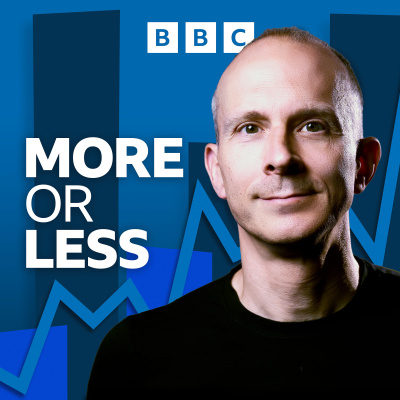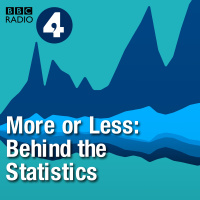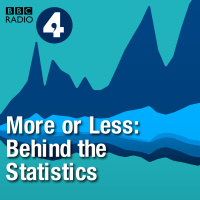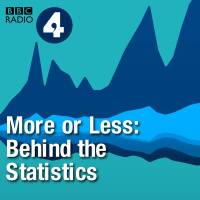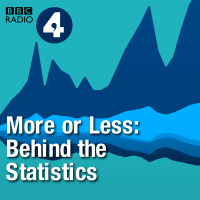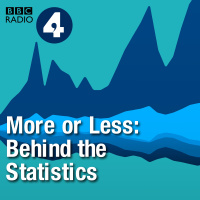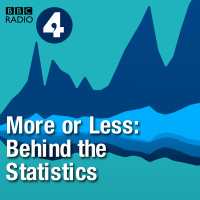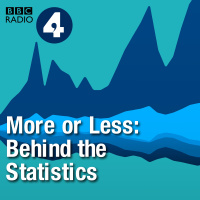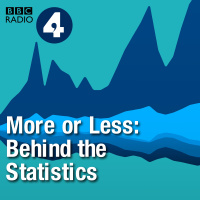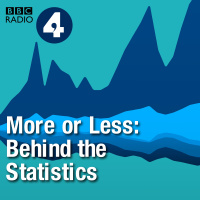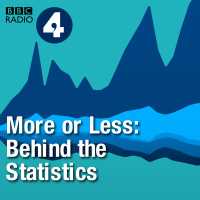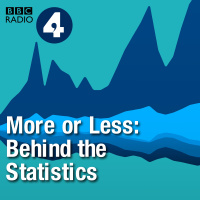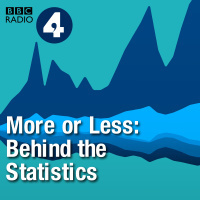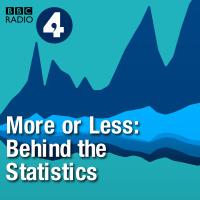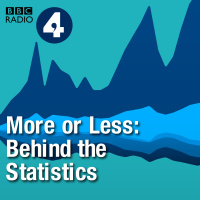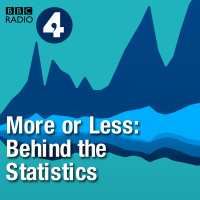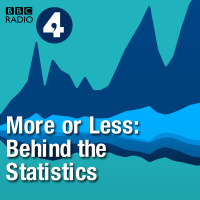Sinopsis
Tim Harford and the More or Less team try to make sense of the statistics which surround us. From BBC Radio 4
Episodios
-
Detecting Bad Science with Data
20/05/2023 Duración: 10minFor more than a decade there’ve been longstanding concerns about the credibility and reliability of science research. This “bad science” has often stemmed from poor data practice or worse. But statistics can also help us identify and understand some of what’s going wrong, whether that’s selective data-slicing or outright fabrication.Tim Harford talks to writer and broadcaster Michael Blastland about his new BBC radio documentary ‘The Truth Police’, which hears from the outsiders who are calling out fraud, malpractice and incompetence in science.Presenter: Tim Harford Producer: Nathan Gower Editor: Richard Vadon Programme Coordinator: Brenda Brown Sound Engineer: James Beard
-
Do 94% of marriages in Portugal really end in divorce?
13/05/2023 Duración: 10minPortugal has a divorce rate of 94% and India just 1%, according to a social media post about divorce in 33 countries that has gone viral. But how are these figures calculated and what do they really tell us about the quality and endurance of marriage? We investigate with guests Marina Adshade, assistant professor at the Vancouver School of Economics and Dr Cheng-Tong Lir Wang of the Institute for the Future in San Francisco.Presenter: Ben Carter Producers: Octavia Woodward and Jon Bithrey Editor: Richard Vadon Production Co-ordinator: Brenda Brown Sound Engineer: Neil Churchill
-
Why is life expectancy falling in the USA?
06/05/2023 Duración: 10minThe average life expectancy of Americans is shrinking at an alarming rate. Between 2019 and 2021, a staggering 2.7 years has been shaved off, leaving the revised figure at 76.1 years - the lowest it’s been in more than two decades. It also sees the U.S. rank 46th in the global life expectancy charts, behind Estonia and just a nose ahead of Panama. Paul Connolly is joined by John Burn Murdoch, Mary Pat Campbell and Dr Nick Mark to discuss why, on average, citizens of the world’s richest country are dying so young.
-
How much is the Coronation crown worth?
29/04/2023 Duración: 10minConsisting of 2 kilograms of gold and 444 gemstones, the iconic St Edward’s Crown will play a central role in the coronation of King Charles III, as it has for many of his predecessors. There has been much speculation as to what the value of the centrepiece of the Crown Jewels really is. Charlotte McDonald talks to Dr Anna Keay, historian and author of The Crown Jewels - the Official History, and Alan Hart, CEO of the Gemmological Association of Great Britain. Together they break down what we know about the crown’s cost to make in the 17th century and what it might be worth today.
-
The Pentagon Leaks and Fox News
22/04/2023 Duración: 09minThe leaking of US intelligence documents and the arrest of a 21 year old airman who authorities believe to be responsible has caused a media and diplomatic storm. We look at how the leaks were reported by primetime Fox News host Tucker Carlson, who said seven Ukrainian troops are dying for every one Russian, contrary to most estimates. And we examine an advert Fox News took out claiming to be the American TV network most trusted for news. With guests Aric Toler from investigative journalism site Bellingcat, data journalist and author G. Elliott Morris and BBC correspondent Olga Ivshina.
-
How accurate is baby's due date?
15/04/2023 Duración: 10minPaul Connolly is expecting his second child, and the due date is just under two weeks away. In hopes of easing his anxiety every time the phone rings , he is joined by Professor Asma Khalil, Professor Chris Pettker and Doctor Melissa Wong to discover exactly how accurate his baby's due date is...Presenter: Paul Connolly Researcher: Octavia Woodward Editor: Richard Vadon Sound Engineer: Graham Puddifoot Production Co-ordinator: Brenda Brown
-
How to better understand and explain numbers
08/04/2023 Duración: 10minThe covid-19 pandemic has brought the use of statistics into everyday life in a way never seen before. Tim Harford talks to Professor Oliver Johnson, author of Numbercrunch: A Mathematician’s Toolkit for Making Sense of Your World, about his visual presentation of covid-19 related figures on Twitter and how we can all improve our understanding and use of numbers.
-
A groundbreaking new proof for Pythagoras’ Theorem?
01/04/2023 Duración: 10minPythagoras’ Theorem, explaining the relationship between the three sides of a right angled triangle, is one of the most famous in maths. It’s been studied and put to use for thousands of years. Now two US high school students say they’ve found a new trigonometric proof for the theorem, something many in the mathematical community believe to be impossible. We discuss Pythagoras’ Theorem, the importance of proofs in maths and the chances of this being a real breakthrough with mathematician, author and YouTuber Matt Parker.
-
Covid vaccines and false claims about miscarriage
25/03/2023 Duración: 09minMisinformation around covid-19 and vaccines is rife and as the data available increases, so do often misleading and even wild claims. This week More or Less examines multiple viral claims that the Covid 19 mRNA vaccines increase the risk of miscarriage. To explain where these incorrect figures come from and what the science actually tells us, we are joined by Dr Viki Male, senior lecturer in reproductive immunology at Imperial College London. Presenter: Charlotte McDonald, Producers: Octavia Woodward and Jon Bithrey Editor: Richard Vadon Sound Engineer: John Scott Production Co-ordinator: Helena Warwick-Cross(Photo by Matthew Horwood/Getty Images)
-
Silicon Valley Bank: a very modern bank run
18/03/2023 Duración: 09minAfter the collapse of Silicon Valley Bank sent jitters through the financial system, Duncan Weldon explains how it’s just the latest in the long history of bank runs.He talks to financial analyst and former banking regulator Dan Davies - author of ‘Lying for Money’ - to understand how bank runs happen, and what the repercussions of this very modern bank run might be for the global financial system. Presenter: Duncan Weldon Producer: Nathan Gower Editor: Richard Vadon Programme Coordinators: Helena Warwick-Cross Sound Engineer: Neva Missirian(Photo credit: Reuters)
-
Do fungi kill three times as many people as malaria?
11/03/2023 Duración: 08minThe smash hit TV show and video game ‘The Last of Us’ has spawned lots of curiosity about how worried we should be about the relatively unknown world of fungi. A figure in a recent BBC online article stated that fungal infections kill around 1.7 million people a year, about three times as many as malaria. In this episode we look at the both the global fight against malaria and David Denning, Professor of Infectious Diseases and Global Health at the University of Manchester explains the risks posed by fungal infections globally.
-
Does your jewellery contain stolen Brink’s-Mat gold?
04/03/2023 Duración: 10minThe Brink’s-Mat robbery remains to this day one of Britain’s biggest and most audacious heists. Six armed men stole diamonds, cash and three tonnes of gold bullion from a warehouse close to London’s Heathrow Airport in November 1983. It’s now the subject of a BBC television drama, The Gold, which includes the claim that most gold jewellery bought in the UK from 1984 onwards will contain traces of that stolen gold. But how true is that? Tim Harford and team investigate, with the help of Zoe Lyons from Hatton Garden Metals and Rob Eastaway, author of Maths on the Back of an Envelope.
-
UK vs European energy prices, falling excess deaths and is 5 grams of cocaine a lot?
01/03/2023 Duración: 28minDoes the UK really have by far the highest domestic energy bills in Europe? We debunk a viral social media claim suggesting just that. Also the number of excess deaths has been falling in the UK - how positive should we be that we’re through the worst? Plus do we really have access to only 3% of rivers and 8% of the countryside in England – and after the conviction of former MP Jared O’Mara we ask whether 5 grams of cocaine is a lot.
-
Do 29,000 coffee pods really go to landfill every minute?
25/02/2023 Duración: 10minHow environmentally destructive is our thirst for coffee? Tim and the team investigate a claim that 29,000 coffee pods end up in landfill globally every minute with the help of Dr Ying Jiang, a senior lecturer in bioenergy from Cranfield University in the UK.
-
Reoffending rates, Welsh taxes and the menopause
22/02/2023 Duración: 29minThe Justice Secretary Dominic Raab says crime reoffending rates in England and Wales have fallen significantly since the Conservatives came to power. We ask whether he’s right and look more broadly at crime and conviction rates with former BBC home affairs correspondent Danny Shaw. Also we look at how much taxes in Wales might have to rise to pay for increases in NHS funding. We ask whether 13 million women in the UK are really menopausal. And we return to the debate that has sparked consternation among loyal listeners everywhere – should the word data be treated as plural or singular.
-
Florence Nightingale and how she visualised data
18/02/2023 Duración: 10minFlorence Nightingale became one of the icons of Victorian Britain for her work as a nurse during the Crimean War and the public health improvements she successfully campaigned for later on. Tim Harford discusses how she and her ‘Nightingale Circle’ used spectacular diagrams to explain health statistics persuasively with RJ Andrews, editor of “Florence Nightingale, Mortality and Health Diagrams”.
-
Nurses' pay, ambulance times and forgotten female economists
15/02/2023 Duración: 28minHow much do nurses in the UK earn compared with those elsewhere in Europe? Tim Harford and the team investigate. Also we have an update on ambulance response times, which were the worst on record in December but are showing signs of improvement. Should we use the word data in the singular or plural? The Financial Times has just changed its policy and Tim’s not happy. We look back at women who have made a key contribution to economics but have often been forgotten. And we hear how a spreadsheet error by the Office for National Statistics made the UK’s productivity appear to be one of the fastest improving in Europe.
-
Spreadsheet disasters
11/02/2023 Duración: 10minThe UK’s Office for National Statistics recently published some dramatically incorrect data - all because of a spreadsheet slip-up. But that’s just the most recent in a long list of times when spreadsheets have gone wrong, often with costly consequencesStand-up mathematician Matt Parker takes us through a short history of spreadsheet mistakes.
-
The IMF and the UK economy, NHS staff shortages and British vs English
08/02/2023 Duración: 28minThe International Monetary Fund says the UK will be the only major economy to shrink in size this year. We ask how much faith we should put in the IMF’s forecasts and look at some of the big economic challenges facing the UK. Also why the headline number of job vacancies in the NHS in England doesn’t tell the whole story of staff shortages. And why has there been such a dramatic change in whether people describe themselves as British or English?
-
Hannah Fry on using shopping data to detect ovarian cancer
04/02/2023 Duración: 09minA new study led by Imperial College in London suggests that data from loyalty card spending in supermarkets and pharmacies could be used as a way of detecting ovarian cancer much earlier. Tim Harford discusses the findings with Professor Hannah Fry, who was most recently on the show talking about her own experience with cancer.
